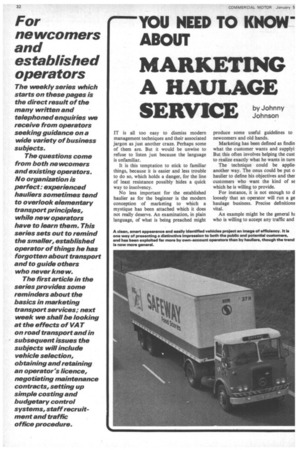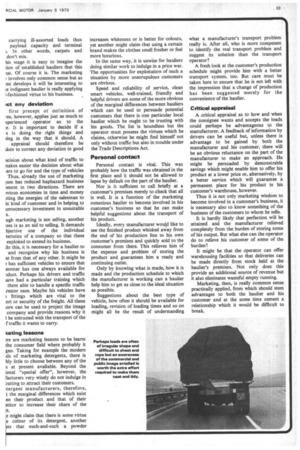YOU NEED TO KNOW ABOUT
Page 34

Page 35

If you've noticed an error in this article please click here to report it so we can fix it.
MARKETING A HAULAGE
SERVICE Johnson
by Johnny
IT is all too easy to dismiss modern management techniques and their associated jargon as just another craze. Perhaps some of them are. But it would be unwise to refuse to listen just because the language is unfamiliar.
It is this temptation to stick to familiar things, because it is easier and less trouble to do so, which holds a danger, for the line of least resistance possibly hides a quick way to insolvency.
No less important for the established haulier as for the beginner is the modern conception of marketing to which a mystique has been attached which it does not really deserve. An examination, in plain language, of what is being preached might produce some useful guidelines to newcomers and old hands.
Marketing has been defined as findin what the customer wants and supplyi But this often involves helping the cust to realize exactly what he wants in turn The technique could be applie, another way. The onus could be put o haulier to define his objectives and ther customers who want the kind of se which he is willing to provide.
For instance, it is not enough to d loosely that an operator will run a ge haulage business. Precise definitions vital.
An example might be the general in who is willing to accept any traffic and carrying ill-assorted loads thus payload capacity and terminal In other words, carpets and don't mix.
his stage it is easy to imagine the ion of established hauliers that this lat. Of course it is. The marketing
r involves only common sense but as ne develops it will be interesting to te indignant haulier is really applying [-fashioned virtue to his business.
rat any deviation first precept of definition of res, however, applies just as much to tperienced operator as to the r. It is important to decide if a s is doing the right things and 4ng in the way that it should. A appraisal should therefore be am to correct any deviation in good ecision about what kind of traffic to cakes easier the decision about what ,ers to go for and the type of vehicles Thus, already the use of marketing [ues has reduced haphazard business )ment in two directions. There are ivious economies in time and money cting the energies of the salesman to ht kind of customer and in helping to unnecessary investment in unsuitable s.
ugh marketing is not selling, another Lses is as an aid to selling. It demands bjective use of the individual teristics of a company so that these exploited to extend its business.
Jo this, it is necessary for a haulier.to and recognize why his business is at from that of any other. It might be ; has sufficient vehicles to ensure that stomer has one always available for aduct. Perhaps his drivers and traffic rave had a particular training which them able to handle a specific traffic reater ease. Maybe his vehicles have i fittings which are vital to the ort or security of the freight. All these Lore can be used to project the image company and provide reasons why it be entrusted with the transport of the f traffic it wants to carry.
keting lessons ;re are marketing lessons to be learnt the consumer field where probably it gam Taking for example the modern ■ ds of marketing detergents, there is bly little to choose between any of the s at present available. Beyond the Lona! "special offer", however, the Facturers very wisely do not indulge in cutting to attract their customers.
tergent manufacturers, therefore, t the marginal differences which exist en their product and that of their etitor to increase their share of the e might claim that there is some virtue e colour of its detergent, another sts that such-and-such a powder increases whiteness or is better for colours, yet another might claim that using a certain brand makes the clothes smell fresher or feel more luxurious.
In the same way, it is unwise for hauliers doing similar work to indulge in a price war. The opportunities for exploitation of such a situation by more unscrupulous customers are obvious.
Speed and reliability of service, clean smart vehicles, well-trained, friendly and helpful drivers are some of the more obvious of the marginal differences between hauliers which can be used to persuade potential customers that there is one particular local haulier which he ought to be trusting with his goods. The list is boundless but the operator must possess the virtues which he claims, otherwise he might find himself not only without traffic but also in trouble under the Trade Descriptions Act.
Personal contact Personal contact is vital. This was probably how the traffic was obtained in the first place and it should not be allowed to lapse by default on the part of the haulier.
Nor is it sufficient to call briefly at a customer's premises merely to check that all is well. It is a function of the marketing conscious haulier to become involved in his customer's business so that he can make helpful suggestions about the transport of his product.
Ideally, every manufacturer would like to see the finished product whisked away from the end of his production line to his own customer's premises and quickly sold to the consumer from there. This relieves him of the expense and problem of storing the product and guarantees him a ready and continuing outlet.
Only by knowing what is made, how it is made and the production schedule to which the manufacturer is working can a haulier help him to get as close to the ideal situation as possible.
Suggestions about the best type of vehicle, how often it should be available for loading, revision of loading times and so on might all be the result of understanding what a manufacturer's transport problem really is. After all, who is more competent to identify the real transport problem and suggest its solution than the transport operator?
A fresh look at the customer's production schedule might provide him with a better transport system, too. But care must be taken here to ensure that he is not left with the impression that a change of production has been suggested merely for the convenience of the haulier.
Critical appraisal A critical appraisal as to how and when the consignee wants and accepts the loads could perhaps be advantageous to the manufacturer. A feedback of information by drivers can be useful but, unless there is advantage to be gained by both the manufacturer and his customer, there will be an obvious reluctance on the part of the manufacturer to make an approach. He might be persuaded by demonstrable savings which might enable him to offer his product at a lower price or, alternatively, by a better service which will guarantee a permanent place for his product in his customer's warehouse, however.
Thus it is not only marketing wisdom to become involved in a customer's business, it is necessary also to know something of the business of the customers to whom he sells.
It is hardly likely that perfection will be attained and the manufacturer relieved completely from the burden of storing some of his output. But what else can the operator do to relieve his customer of some of the burden?
It might be that the operator can offer warehousing facilities so that deliveries can be made directly from stock held at the haulier's premises. Not only does this provide an additional source of revenue but it also eliminates wasteful empty running.
Marketing, then, is really common sense practically applied, from which should stem advantages to both the haulier and his customer and at the some time cement a relationship which it would be difficult to break.




























































































